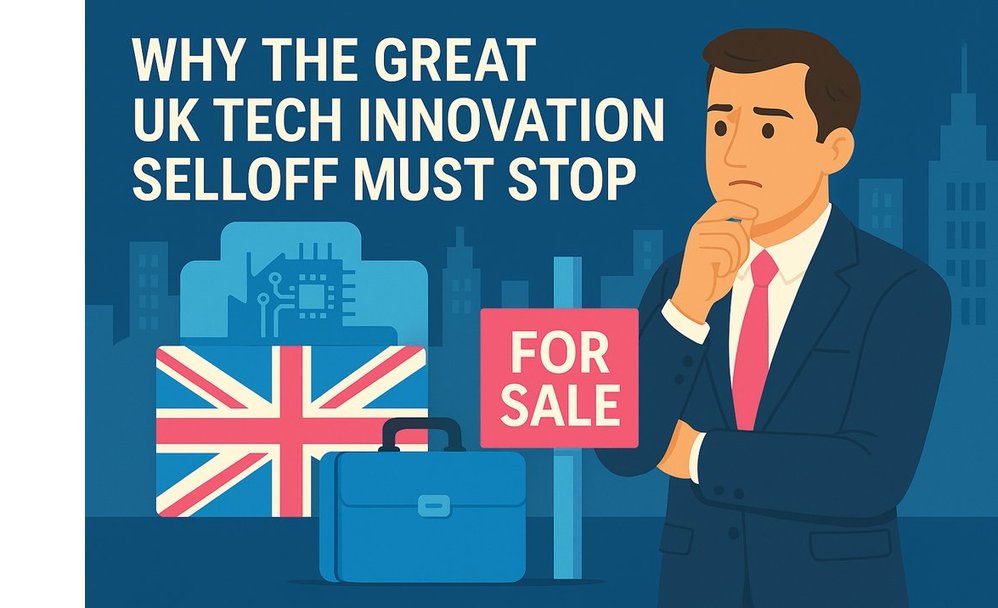How the UK Loses Tech IP…
The trend of intellectual property (IP) created in UK tech startups being lost through acquisition has been prevalent for many years. Those particularly active in taking over UK businesses are global tech giants, mainly from the United States (US) and their investors. This phenomenon raises significant concerns about the UK’s ability to retain and develop homegrown competitive advantage, as much of the unique tech IP and innovative capabilities are often lost in the process. Does this help explain why tech unicorns are so rare in the UK, and how much capital value might have been lost over the years due to these acquisitions? More to the point, how much longer are we going to allow the great UK tech innovation selloff to continue?

Non-Sovereign Proprietorships
The UK has become a fertile ground for tech innovations spawning new startups, with a vibrant ecosystem fostering entrepreneurship. This is helped by much improved seed and private equity funding opportunities. However, the success of these startups often leads to their ownership transfer to foreign entities, either through a trade acquisition, new funding round or an Initial Public Offering (IPO). This results in the handover of IP and innovative technologies to non-sovereign proprietorship.
While such financial events can represent great exit strategies, offering significant returns to founders and early investors, they also mean the UK loses some of the potential long-term benefits of these innovations, such as job creation, economic growth and technological leadership. The US is the major benefactor, mainly due to the comparative mammoth size of its tech industry, supportive investor community and more benevolent regulatory environment, allowing it to eat up every opportunity or competitor in its sights.
Examples of UK Tech Acquisitions:
DeepMind Technologies
DeepMind, an artificial intelligence (AI) company founded in London in 2010 was acquired by Google in 2014 for approximately $500 million. It would be hard for any founding team to turn that down. DeepMind’s cutting-edge AI technology, which had significant potential to enhance the UK’s technological standing, is now under the umbrella of Alphabet Inc., Google’s parent company.
ARM Holdings
ARM, a leading semiconductor and software design company headquartered in Cambridge, was acquired by Japanese conglomerate SoftBank in 2016 for £24 billion. Although ARM remains headquartered in the UK, the transfer of ownership raised concerns about the control and future direction of its IP. The company then completed its IPO on the Nasdaq in September 2023, after a potential sale to Nvidia fell through.
Magic Pony Technology
This UK-based startup developed machine learning techniques for visual processing and was acquired by Twitter in 2016 for around $150 million. The acquisition moved Magic Pony’s innovative technology into the hands of an American social media giant. This limits the UK’s potential to harness and develop this technology independently, leaving it with not so much of a Magic Pony as a My Little Pony.
Stock Listings State-Side
UK tech companies often prefer listing on US stock exchanges, such as the Nasdaq or the New York Stock Exchange (NYSE), rather than the London Stock Exchange (LSE) due to several key factors. Firstly, the US markets offer access to a larger pool of capital and a broader base of institutional investors who are more familiar with tech stocks and willing to invest at higher valuations. The depth and liquidity of US markets are attractive for companies seeking to raise significant funds and achieve a higher profile. Additionally, the regulatory environment in the US, despite being rigorous, is perceived as more conducive to the high-growth nature of tech companies, with rules that align well with the fast-paced nature of the tech industry.
Access to Capital
Another reason for choosing US exchanges is the prestige and global visibility that comes with a Nasdaq or NYSE listing. Being listed on these exchanges can enhance a company’s reputation and help attract international talent and partnerships. The trend of UK tech firms looking to the US for IPOs was exemplified by the decision of companies like Cazoo and Arrival, which opted for US listings to capitalise on these advantages. UK tech giant Arm, headquartered in Cambridge with nearly 3,000 staff, snubbed London for a $54.5 billion listing on New York’s Nasdaq exchange in 2023. Arm is a highly regarded and successful tech business that the UK couldn’t keep, regardless of where the head office is located.
Coming From Behind
As for the future, this trend of IP migration to the US may continue, especially if the US market remains more attractive in terms of valuation, liquidity and investor base. However, recent efforts by the UK government to reform listing rules and make the LSE more appealing to tech companies attempts to alter this dynamic. Initiatives such as easing restrictions on dual class share structures and reducing the free float requirement aim to make the UK more competitive. If these reforms succeed in creating a more tech-friendly environment, we might see a shift with more UK companies considering London for their IPOs. Whether there will be any significant change remains to be seen but recent changes to capital gains tax must be reversed if entrepreneurs are to be incentivised.
The Impact on the UK Tech Industry
The constant drain of IP through foreign acquisition has significant implications for the UK tech industry. While a proportion of the financial returns from these acquisitions are often reinvested into the UK economy, the long-term benefits of retaining IP within the country are lost.
The Lost Economic Benefits Include:
- Job Creation
Retaining IP and scaling companies domestically could lead to the creation of higher-skilled jobs, bolstering the UK workforce and reducing brain drain.
- Economic Growth
The development and commercialisation of innovative technologies within the UK could stimulate economic growth and increase the country’s competitiveness on the global stage.
- Technological Leadership
By retaining control over IP, the UK could position itself as a leader in emerging technologies, such as AI, machine learning and biotechnology, influencing global standards and practices.
Lost Economic and Capital Value
Quantifying the capital value lost due to the export of IP is challenging, as it involves estimating the potential growth and market value of startups had they remained independent. *It is estimated that foreign buyers have acquired at least 3,000 UK tech firms since 1990, at a total estimated value exceeding £350 billion, heavily weighted toward the last 15 years. When a UK tech company is bought out and the ownership moves abroad, the UK loses the compounding effect of these activities.
Economists estimate the economic multiplier for a healthy domestic tech company is 2–2.5x. This means, for every £1 of direct revenue, £2-2.50 of broader UK economic activity is generated (hiring, services, suppliers, etc.). So, losing high-growth tech firms results in multi-billion pound opportunities being shifted abroad instead of growing inside the UK, which could represent a loss of somewhere between 2.5-4% of UK GDP.

UK Tech Under Attack
The above numbers are simple estimates just to demonstrate that the UK’s ability to build a sustainable and thriving sovereign tech industry has been under attack for years. This trend applies to companies in other sectors as well and signifies a structural, economic, and political failing to protect UK IP and provide the required ecosystem to nurture, grow and finance businesses throughout their growth and development. Critical sectors like AI, chip design, cybersecurity and quantum computing have been sold off.
The lost value isn’t just economic, as the UK also risks losing national influence over emerging tech sectors crucial to future economies. The UK government has finally recognised this as a strategic vulnerability, leading to new legislation like the National Security and Investment Act (2021). I’m not convinced that Ministers should be meddling directly in industries and making decisions on who can or can’t buy a company, but if the UK government is serious about helping it needs to focus on reducing the regulatory and financial burden on tech firms, not increasing them.
You may want to read: “How to Build and Sustain a Sovereign UK Tech Industry.”






